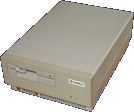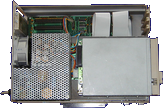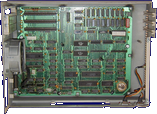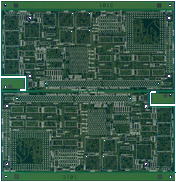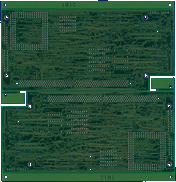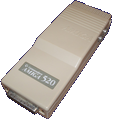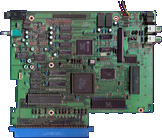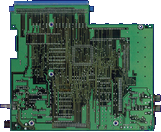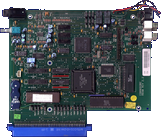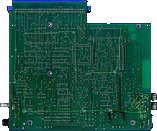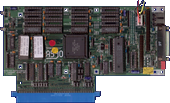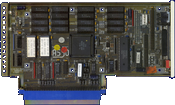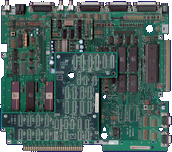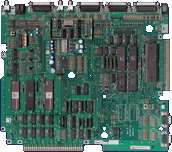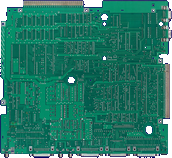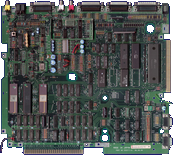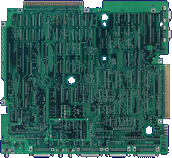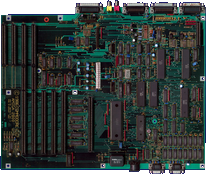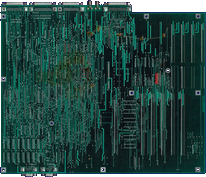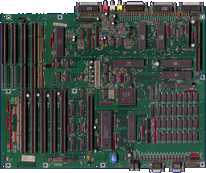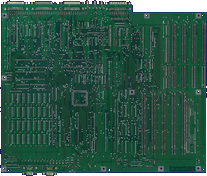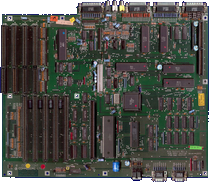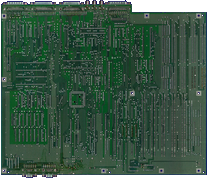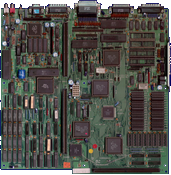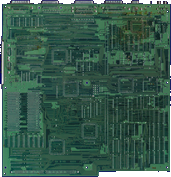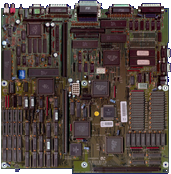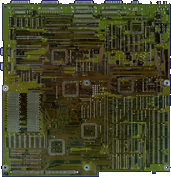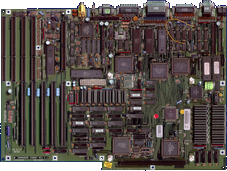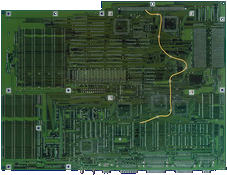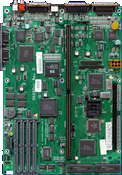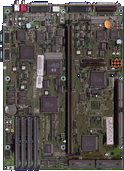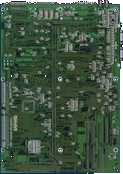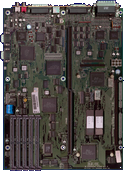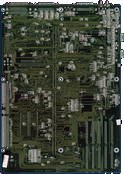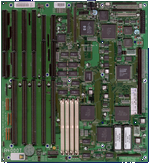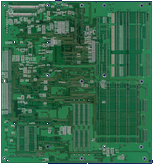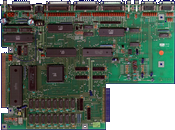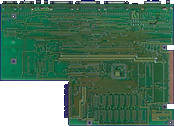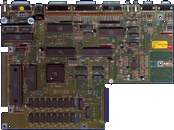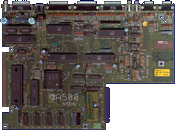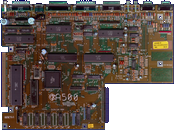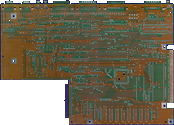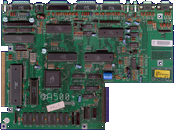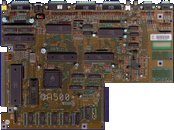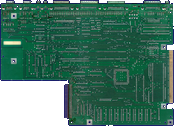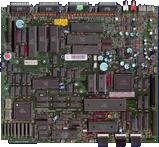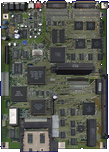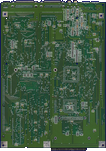Search Result
55 expansions found
Company Commodore, USA | Date 1985 | Amiga A1000 | Interface trapdoor slot |
- 256 kB Chip RAM expansion
- eight 64k×4 DIPs
- connects to the front panel expansion slot
Company Commodore, USA | Date 1986 | Amiga A1000 | Interface side expansion port |
- IBM XT emulation
- 8088 @ 4.77 MHz
- optional 8087 FPU
- sixteen DIP sockets for up to 512 kB RAM - 256 kB is preinstalled in eight of the sockets
- supports 256k×1 150 ns or faster DIPs, in 128, 256, 512 kB configurations
- RAM can be expanded up to 640 kB using a RAM expansion card in an XT slot
- 128 kB dual port RAM visible by both the Amiga and PC (8 kB for mono display, 32 kB for colour display, 16 kB used for maintenance of records, 64 kB for data exchange, 8 kB used for I/O registers)
- connects to the side expansion port
- covers the mouse and game ports, they are passed through to the front of the Sidecar
- requires the A1000 to be expanded to 512 kB (ie. by the A1050 expansion cartridge)
- turning on power to the Sidecar unless the Amiga is powered up can seriously damage the Amiga - use the attached power-cord extender so the A1000 is powered through the Sidecar, though this means the A1060 has to be turned on all the time even if it is unused
- two display modes
- monochrome: instead of green text on black screen, the Sidecar can display four colours in PC monochrome mode - the colour of text, intensified text and the background are independent of each other and freely adjustable
- colour: text can be rendered in up to 16 colours, and graphics can be up to 4 colours
- neither modes support blinking of text
- can use the Amiga parallel port - it has to be dedicated to either the Amiga or the PC side exclusively
- printing works only for applications using interrupt handshaking - those writen with busy-wait loops will not work (eg. Print Screen)
- three XT ISA slots
- optional 1 MB memory expansion for the Amiga side
- 360 kB 5.25" floppy drive built in - up to four floppy drives are supported
- CBM-AmigaJanus21-3683.dms
install disk v2.1
janus.library v36.83 (21.8.91)
280 kB - CBM-PCInstall-334.dms
install disk v1.02
janus.library v33.4 (11.09.1989)
328 kB - CBM-PCInstall-331.dms
install disk
janus.library v33.1b5 (25.10.1988)
324 kB - CBM-PCInstall-322.dms
install disk
janus.library v32.2 (25.04.1986)
182 kB - CBM-PCJanus.zip
PC Software
99 kB
Company Commodore, USA | Date 1987 | Amiga A1000 | Interface RGB port |
- genlock and sound mixer
- connects to the 23 pin RGB connector and slips under the A1000
- allows overlaying Amiga graphics onto an incoming video signal
- composite input and output (two RCA connectors)
- two stereo audio inputs and one stereo output
- audio mixer for the two inputs
- horizontal position and hue adjustments
- DB23 RGB passthrough connector
- A1300Demo.DMS
Installer's Heaven
utilities disk
318 kB
Company Commodore, USA | Date 1986 | Amiga A2000 | Interface CPU slot |
- the built-in Fast RAM card of the A2000-A (which has only 512 kB Chip RAM on its motherboard)
- 512 kB RAM soldered on board (16 DIPs), 150 ns
- 16 additional DIP sockets accept another 512 kB RAM for 1 MB total
- accepts 256k×1 DIPs only
- maprom function
- possible configurations:
- 512 kB system RAM
- Kickstart RAM
- 1 MB system RAM
- Kickstart RAM + 512 kB system RAM
- connects to the CPU slot
Company Commodore, USA | Date 1986 | Amiga A2000 | Interface video slot |
- video modulator
- allows TV sets to display Amiga graphics
- colour composite output (RCA)
- monochrome composite output (RCA)
- a DIN connector provides RF modulated video and stereo audio output
- the A2031 is PAL, the A2032 is NTSC version
Company Commodore, USA | Date 1986 | Amiga A2000, A3000, A4000 | Interface Zorro II | Autoconfig ID 514 / 10 |
- 64 DIP sockets accept 2 MB RAM
- supports 0.5, 1 or 2 MB configurations
- accepts 256k×1 DIPs only
Company Commodore, USA | Date 1986 | Amiga A2000, A3000, A4000 | Interface Zorro II | Autoconfig ID 514 / 10 |
- RAM expansion card
- 64 DIP sockets accept 8 MB RAM
- 2 MB RAM preinstalled
- supports only 2, 4 or 8 MB configurations, it cannot be set to 6 MB
- accepts 1M×1 DIPs only, 120 ns or faster
- no waitstates
- jumper settings
| J1 ON ON OFF OFF |
J2 ON OFF ON OFF |
- 2 MB - 4 MB (U16-U32 and U55-U62) - diagnostic mode - 8 MB |
- notes
- some revision 3 boards have 8 MB pre-installed from factory with DIP chips soldered in (no sockets)
- A2058.dms
install disk
100 kB
Company Commodore, USA | Date 1990 | Amiga A2000, A3000, A4000 | Interface Zorro II | Autoconfig ID 514 / 8,9 |
- Arcnet interface
- developed from the Ameristar Arcnet Controller
- Arcnet networking system - old, slow but cheap and reliable, useful for small LANs and simple network sharing
- Arcnet requires RG62 coaxial cable instead of the RG58 used on Ethernet systems
- uses 93 ohm terminators opposed to the 50 ohm used by Ethernet
- the Arcnet interface hybrid chip comes in two different versions, HCY 9058 for bus networks and HCY 9068 for star networks
- the manual says the card uses a bus network layout with up to 256 nodes but many A2060s has 9068 hybrids for a star network layout allowing only four cards to be connected together
- to solve this the HCY 9068 can be simply replaced with a HCY 9058 chip
- interrupt driven (polled I/O) - one interrupt on the Amiga yields into a busy system
- to reduce traffic the driver uses the Arcnet hardware's four buffer as a single FIFO buffer
- the badly written driver (a2060.device) has some bugs in the FIFO buffer which results in lost packets and packet collisions - increased traffic on the Arcnet bus
- manual says 2.5 Mbit/s (300 kB/s) transfer speed but only max 100 kB/s is achievable
- socket for optional network autoboot ROM
- bus activity LED connector
- supported by NetBSD and OpenBSD
Company Commodore, USA | Date 1990 | Amiga A2000, A3000, A4000 | Interface Zorro II | Autoconfig ID 514 / 90,112 |
- Ethernet interface
- based on the Ameristar Ethernet Controller
- AMD Am7990 Ethernet controller
- 10 Mbit/s transfer speed
- 32 kB buffer shared between the Am7990 and the Amiga
- uses DMA transfers for the onboard buffer
- BNC and DB15 (AUI) connectors
- Thick Ethernet 10Base5
- segment length: 500 meters without repeaters
- network length: 2500 meters without repeaters
- 100 nodes per segment
- min. node spacing: 2.5 meters
- requires transceiver cable
- Thin Ethernet 10Base2
- segment length: 185 meters without repeaters
- network length: 925 meters without repeaters
- 30 nodes per segment
- min. node spacing: 0.5 meters
- no direct support for 10BaseT
- SANA II and MNI drivers
- supported by Linux, NetBSD and OpenBSD
Company Commodore, USA | Date 1990 | Amiga A2000, A3000, A4000 | Interface Zorro II, ISA |
- IBM XT emulation
- NEC V20 @ 4.77 / 7.15 / 9.54 MHz (PLCC)
- the different clock speeds are switchable by software (Ctrl-S, Ctrl-T, Ctrl-D)
- 640 kB RAM
- 16 kB XT compatible BIOS
- no floppy drive supplied - it uses the built in 3.5" Amiga disk drive
- the drive can either shared between the Amiga and PC, either assigned exclusively to one of them
- can use any other Amiga floppy drives too: internal or external, DD or HD, 3.5" or 5.25"
- parallel interface and mouse are emulated by the Amiga
- piezo beeper
- CBM-PCInstall-334.dms
install disk v1.02
janus.library v33.4 (11.09.1989)
328 kB - CBM-PCJanus.zip
PC Software
99 kB
Company Commodore, USA | Date 1986 | Amiga A2000, A3000, A4000 | Interface Zorro II, ISA | Autoconfig ID 513 / 1 |
- IBM XT emulation
- 8088 @ 4.77 MHz
- optional 8087 FPU
- 512 kB RAM
- 16 kB XT compatible BIOS
- 360 kB 5.25" floppy drive supplied
- 720 kB 3.5" - uses external Amiga floppy drives on the external connector
- CGA 640x200x2 or 320x200x4 modes selectable with jumpers
- can use Amiga parallel ports
- could be upgraded to 386 with the Roßmöller 386si
- A2088XT.pdf
user manual (german) + addendum
734 kB - A2088-A2286.pdf
user's guide
38.0 MB
- CBM-AmigaJanus21-3683.dms
install disk v2.1
janus.library v36.83 (21.8.91)
280 kB - CBM-PCInstall-334.dms
install disk v1.02
janus.library v33.4 (11.09.1989)
328 kB - CBM-PCInstall-331.dms
install disk
janus.library v33.1b5 (25.10.1988)
324 kB - CBM-PCInstall-322.dms
install disk
janus.library v32.2 (25.04.1986)
182 kB - CBM-PCJanus.zip
PC Software
99 kB - A2088Turbo.lha
speedup modification
7 kB
Company Commodore, USA | Date 1987 | Amiga A2000, A3000, A4000 | Interface Zorro II | Autoconfig ID 514 / 1515 / 3 |
- SCSI and ST-506 controller
- supports seven SCSI and two ST-506 devices at once
- the SCSI drives are controlled by the WD 33C93 IC
- the ST-506 drives are controlled by the Zilog Z80B CPU
- the 33C93 chip can be controlled by either the 68000 (default) or by the Z80
- DMA transfers are provided by the custom Commodore 8727 IC featuring a 64 byte FIFO buffer
- the Z80 CPU has 2 kB RAM to buffer commands from the Amiga, 8 kB PROM with driver routines and 1 kB RAM for storage of variables
- cannot autoboot
- does not support the SCSI Direct protocol
- does not support partitions and drives larger than 256 MB
- the ST-506 interface does not support 16-head drives
- 50 pin internal SCSI connector
- DB25 external connector
- hard disk activity LED connector
- on Zorro III machines the card only works if the driver and all the buffers are loaded into chip RAM
- A-Max II driver (hddisk.amhd)
Company Commodore, USA | Date 1988 | Amiga A2000, A3000, A4000 | Interface Zorro II | Autoconfig ID 514 / 1515 / 3 |
- SCSI and ST-506 controller
- supports seven SCSI and two ST-506 devices at once
- the SCSI drives are controlled by the WD 33C93 IC
- the ST-506 drives are controlled by the Zilog Z80B CPU
- the 33C93 chip can be controlled by either the 68000 (default) or by the Z80
- DMA transfers are provided by the custom Commodore 8727 IC featuring a 64 byte FIFO buffer
- the Z80 CPU has 2 kB RAM to buffer commands from the Amiga, 8 kB PROM with driver routines and 1 kB RAM for storage of variables
- three autoboot ROMs
- custom bootblock design
- does not support the SCSI Direct protocol
- does not support partitions and drives larger than 256 MB
- the ST-506 interface does not support 16-head drives
- 50 pin internal SCSI connector
- DB25 external connector
- hard disk activity LED connector
- on Zorro III machines the card only works if the driver and all the buffers are loaded into chip RAM
- A-Max II driver (hddisk.amhd)
- hard disk kits
- the A2090A was sold in kit form which included the controller itself, a hard disk, cables, installation disk and manual
- A2092: A2090A bundled with a 20 MB Miniscribe 8425 hard disk
- A2094: A2090A bundled with a 45 MB Toshiba MK-134FA or a 46 MB Rodime RO-3055 hard disk
- all of these hard disks are ST-506 drives
- 2090a.dms
Installer's Heaven
A2090A install disk
346 kB - A2090A-Miniscribe8425.dms
A2092 install disk, mountlist for Miniscribe HD
337 kB - A2090A-RodimeRO3055.dms
A2094 install disk, mountlist for Rodime HD
337 kB - A2090A-ToshibaMK134FA.dms
A2094 install disk, mountlist for Toshiba HD
338 kB
Company Commodore, USA | Amiga A2000 | Interface Zorro II | Autoconfig ID 514 / 4 |
- autobooter
- provides autoboot functionality for the Commodore A2090 SCSI controller
- two autoboot ROMs
Company Commodore, USA | Date 1991 | Amiga A2000, A3000, A4000 | Interface Zorro II | Autoconfig ID 514 / 2,3,10 |
- SCSI controller
- Western Digital 33C93
- uses the same DMAC custom chip for DMA transfers as the A3000
- knows the Rigid Disk Block and SCSI Direct protocols
- built in XT IDE (8 bit) hard disk controller - the connectors and LED are not installed but their place is visible on the card
- 50 pin internal SCSI header
- DB25 external connector
- a 3.5" hard disk can be mounted on the card
- 16 kB autoboot ROM (can be disabled) - autobooting requires at least Kickstart 1.3
- revision 7.0 of the ROM is necessary for 68040 machines
- supports SCSI network sharing
- supported by Linux, NetBSD and OpenBSD
- A-Max II driver (scsi.amhd)
- memory
- sixteen DIP sockets accept 0.5, 1 or 2 MB RAM
- supports 256k×4 (44256) chips, 120 ns or faster
- cannot use DMA to transfer data to 32 bit fast RAM
- if Zorro II DMA memory is not available the driver falls back to programmed I/O transfers
- performs extremely slow in the A4000 because of the above mentioned two problems
- A2091-130.dms
setup disk v1.30
381 kB - 2091install127.DMS
Installer's Heaven
install disk v1.27
378 kB - A2091Turbo.lha
A2091Turbo v1.3 - DMA fix for A4000
5 kB - a4091patch2.lha
Installer's Heaven
another DMA fix for A4000
7 kB
Company Commodore, USA | Date 1990 | Amiga A2000, A3000, A4000 | Interface Zorro II | Autoconfig ID 514 / 69,70 |
- serial interface
- a complete computer on its own leaving the Amiga free for other tasks
- 65CE20 @ 3.58 MHz controls the I/O operations
- has 4 times the computing power of a C64
- 16 kB RAM
- the RAM is addressable by the MC680x0
- seven 8 pin mini-DIN serial ports
- not completely RS232C compatible, the RI signal (Ringing) is missing
- has jumpers for each port to exchange the RxD (Recieve Data) and TxD (Transmit Data) lines - nullmodem mode without using special cable
- seven adaptor cables with DB25 RS232C compatible serial ports supplied (80 cm long)
- 50-19200 bps transfer speed for each port
- the card is capable of 115200 bps mode but only with the supplied software
- up to five A2232 can be installed into one machine giving a total of 36 serial ports
- supported by NetBSD (normal and turbo modes) and OpenBSD
- A2232-3313.zip
driver update
serial.device v33.13 (01.08.1991)
9 kB - A2232-3311.dms
install disk
serial.device v33.11 (22.05.1990)
104 kB - a2232.dms
Installer's Heaven
install disk
103 kB - a2232tuning.lha
Installer's Heaven
driver update
23 kB
Company Commodore, USA | Date 1989 | Amiga A2000, A3000, A4000 | Interface Zorro II, ISA | Autoconfig ID 513 / 2 |
- IBM AT emulation
- 80286 @ 8 MHz
- optional 80287 FPU
- 1 MB RAM
- 16 kB AT compatible BIOS
- battery connector to store BIOS setup
- 1.2 MB 5.25" floppy drive supplied
- 1.44 MB 3.5" supported
- CGA 640x200x2 or 320x200x4 modes selectable with jumpers
- can use Amiga parallel ports
- A2088-A2286.pdf
user's guide
38.0 MB
- CBM-AmigaJanus21-3683.dms
install disk v2.1
janus.library v36.83 (21.8.91)
280 kB - CBM-PCInstall-334.dms
install disk v1.02
janus.library v33.4 (11.09.1989)
328 kB - CBM-PCInstall-331.dms
install disk
janus.library v33.1b5 (25.10.1988)
324 kB - CBM-PCInstall-322.dms
install disk
janus.library v32.2 (25.04.1986)
182 kB - CBM-PCJanus.zip
PC Software
99 kB
Company Commodore, USA | Date 1990 | Amiga A2000 | Interface video slot |
- internal genlock
- A2300: NTSC genlock
- A2301: PAL genlock
- allows overlaying Amiga graphics onto an incoming video signal
- composite input and output (two RCA connectors)
- 23 pin RGB connector for attaching an Amiga monitor
- a small switch on the bracket allows to toggle between incoming video, overlayed video and Amiga graphics
- A2300.dms
demo disk
354 kB
Company Commodore, USA | Date 1991 | Amiga A2000, A3000, A4000 | Interface video slot |
- deinterlacer
- a video deinterlacer board based on the Amber chip from the A3000 motherboard
- doubles all 15.75 kHz screen modes to 31.5 kHz
- HD15 VGA connector
- enable / disable switch
- full overscan support
- dual port static RAM bank - new video and cleaned video are read in and outputted simultaneously
- although originally designed for the A2000 it works in the A4000
- some modifications are needed to fit the board securely into the A4000 video slot
- the board gets confused by some of the doubled AGA modes, and rather passing them through it tries to double them to 55 kHz or above - on these modes the board has to be disabled with the switch
- it samples 12 bits for each colour, on the A4000 the upper 12 bits of the 24 bit AGA information, so AGA screen modes with more than 32 colours or HAM6 will have the colours quantized to a certain degree
- compatible with some genlocks
- A2320-12.dms
test disk v1.2
487 kB - 2320test.utils.DMS
Installer's Heaven
utilities disk
486 kB
Company Commodore, USA | Date 1991 | Amiga A2000, A3000, A4000 | Interface Zorro II, ISA | Autoconfig ID 513 / 103514 / 103 |
- IBM AT emulation
- 80386 SX @ 16 / 20 / 25 MHz (32 bit internally, 16 bit external bus)
- optional 80387 FPU
- sixteen ZIP sockets accept up to 8 MB RAM
- 1 MB factory installed
- supports 256k×4 or 1M×4 page mode ZIPs, 80-120 ns or faster
- accepts ZIPs in groups of four
- 64 kB AT compatible BIOS
- upgrading the BIOS and fitting a ZIP to SIMM converter makes possible to use 16 MB RAM
- 128 kB dual-port RAM for data exchange between the BridgeBoard and the Amiga
- can use a PC hard disk (with additional ISA controller), virtual drives on Amiga partitions (hardfiles), you can even have an Amiga partition on the PC hard drive
- PC floppy drives can be used in an internal bay, Amiga floppy drives can be used as PC only or shared, external Amiga drives can be connected directly to DB23 floppy connector of the BridgeBoard
- only two floppy drives are accessible by the BridgeBoard
- the Amiga supports MDA (monochrome) and CGA modes through the native display (CGA 640x200x2 or 320x200x4 modes) - you can toggle between Amiga and PC screens
- with an ISA VGA board a separate monitor is needed
- the card uses the Amiga's serial or parallel ports for printing
- for modems it can only use an internal ISA modem or serial card
- PC beeper on board
- much slower than a PC with the same processor
- card occupies 512kB in the Zorro II address space - when installed, only 7.5 MB of the address space is left for other expansion cards
- CBM-AmigaJanus21-3683.dms
install disk v2.1
janus.library v36.83 (21.8.91)
280 kB - CBM-PCJanus.zip
PC Software
99 kB
Company Commodore, USA | Date 1991 | Amiga A2000, A3000, A4000 | Interface Zorro II | Autoconfig ID 1030 / 01004 / 245 |
- RTG graphics card
- Texas Instruments TMS34010 @ 50 MHz
- 2 MB RAM, sixteen 1M×1, 100 ns ZIP VRAMs
- 1 MB video frame buffer, 0.75 MB program overlay, 0.25 MB overlay bitplanes
- screen modes
- 256+3 colours from a 24 bit palette
- screen modes - only two is available one time by installing the appropriate oscillators
- 14.318 MHz - 512×512 interlace, quad buffering
- 14.318 MHz - 640×400 interlace
- 36 MHz - 800×600 non-interlace (default)
- 44.9 MHz - 1024×768 interlace
- 48 MHz - 1024×768 interlace
- 67.88 MHz - 1024×768 non-interlace (default)
- 80 MHz - 1024×1024 interlace
- default is 800×600 and 1024×768 non-interlaced
- software switching between the two clock sources
- notes
- RS343 compatible video sync on green and / or separate TTL sync
- programmable synchronization timing
- HD15 connector
- no video passthrough
- originally built for A3000UX machines
- intended to use its not very well developed TIGA system
- CyberGaphX 2, 4.2 and EGS drivers
- supported by NetBSD (except for X server) and OpenBSD
- A2410_HWSW_Overview.pdf
A2410 Hardware/Software Overview
162 kB
- EGSA2410Classi.lha
Aminet
EGS driver v1.14
214 kB - a2410publickey.lha
Aminet
EGS public keyfile
2 kB - a2410src.lha
Aminet
TIGA Workbench
182 kB
Company Commodore, USA | Date 1988 | Amiga A2000 | Interface CPU slot | Autoconfig ID 514 / 80 |
- processor
- 68020 @ 14 MHz, synchronous with the motherboard
- 68851 memory management unit
- factory installed 68881 @ 14 MHz, supports FPUs up to 68882 @ 25 MHz
- can be upgraded to 68030 with the Harms Professinal-Pack 030 board
- memory
- 2 or 4 MB 32 bit RAM
- 16 or 32 256k×4 page mode ZIPs 80-100 ns
- not expandable
- RAM can be disabled or autoconfigured by setting a jumper
- notes
- the first accelerator board for the A2000
- boot ROMs below rev 6 are incompatible with Kickstart 2.0 and above
- the ROM address space overlaps the upper 256 kB of the 512 kB Kickstart ROMs (Kickstart 1.3 is 256 kB only)
- by the time AmigaOS loads, the boot ROMs are supposed to be off but due to a bug in the A26x0 ROM code they remain active, causing an address space collision
- fitting a rev 6 or 7 ROM pair solves the problem
- some boards are reported being incompatible with the newer ROMs either
- in 68000 fallback mode the RAM is still available
- A2620_A2630_Addendum.pdf
Addendum to A2630 User's Guide and A2620 Installation Guide (english)
15 kB
Company Commodore, USA | Date 1989 | Amiga A2000 | Interface CPU slot | Autoconfig ID 514 / 81 |
- processor
- 68030 @ 25 MHz, PGA
- 68882 @ 25 MHz, PGA
- can be upgraded to 50 MHz with CSA's Rocket Launcher
- memory
- 2 or 4 MB RAM on board
- capable of DMA, but does not support burst mode
- 16 or 32 256k×4 page mode ZIPs 80-100 ns
- expansion slot for third party RAM boards
- RAM can be disabled or autoconfigured by setting a jumper
- notes
- jumper selects whether autoboot into AmigaDOS or UNIX
- boot ROMs below rev 6 are incompatible with Kickstart 2.0 and above
- the ROM address space overlaps the upper 256 kB of the 512 kB Kickstart ROMs (Kickstart 1.3 is 256 kB only)
- by the time AmigaOS loads, the boot ROMs are supposed to be off but due to a bug in the A26x0 ROM code they remain active, causing an address space collision
- fitting a rev 6 or 7 ROM pair solves the problem
- in 68000 fallback mode the RAM is still available
- jumper settings
- rev 6
- rev 9
| J301 - | RAM size: ON - 2 MB, OFF - 4 MB |
| J302 - | B2000: ON - german A2000 |
| J303 - | RAM autoconfig: ON - disabled |
| J304 - | OS: ON - UNIX, OFF - AmigaOS |
| J202 - | FPU clock: ON - same as CPU clock |
| J200 - | reserved |
| J202 - | FPU clock: 1-2 - same as CPU clock, 2-3 - from oscillator U203 |
- A2620_A2630_Addendum.pdf
Addendum to A2630 User's Guide and A2620 Installation Guide (english)
15 kB - A2630_R2B2-Umbauanleitung.pdf
Umbau einer A2630 Turbokarte auf 28 bzw. 30 MHz (german)
41 kB - A2630.pdf
User's Guide (english)
2.1 MB
Company Commodore, USA | Date 1993 | Amiga A4000 | Interface CPU slot |
- processor
- 68030 @ 25 MHz, QFP
- option for 68020 (meant for an even cheaper version of A4000)
- optional 68881 / 68882 FPU, PLCC or PGA
- notes
- no memory option - but it has faster motherboard RAM access than that of the A3640
Company Commodore, USA | Date 1992 | Amiga A3000, A4000 | Interface CPU slot |
- processor
- 68LC040 / 68040 @ 25 MHz
- can be upgraded to 50 MHz with the Doubler 4000
- general notes
- no memory option - slow motherboard RAM access
- memory can be added with the X-Calibur memory expansion board
- does not support the 040's burst RAM access (7/7/7/7 clock cycles - 14.3 MB/s memory bandwidth)
- on many A3640's the electrolyt capacitors are mounted in the wrong direction, reducing lifetime - even the PCB print is wrong
- A3640's made by Amiga Technologies have the capacitors in the right direction, but the PCB print is still wrong
- A3000 notes
- only v3.1 or v3.2 versions of the board work in A3000
- v3.1 works but has problems with certain Zorro cards which use DMA
- v3.2 works correctly
- with Kickstart 2.04 the card does not work with the combination of Ramsey-04 and static column fast RAM
- at least bank 0 should be page mode RAM
- the combination of Ramsey-07 and DMAC-04 works perfectly
- with Kickstart 3.1 there's no such problem
Company Commodore / DKB, USA | Date 1993 | Amiga A3000, A4000 | Interface Zorro III | Autoconfig ID 513 / 84514 / 84 |
- Fast SCSI 2 DMA controller
- NCR 53C710
- autoboot ROM
- 50 pin internal connector
- 50 pin HD Centronics external connector - expensive cables and terminators
- place for a 3.5" hard disk on the card
- active SCSI bus termination
- no RAM option
- only works with Buster 11, either installed in A3000 or A4000
- does not work with A3640 equipped A3000s
- early, Commodore built boards booted only under Kickstart 3.x
- supported by Linux, NetBSD and OpenBSD
- DIP switch settings
| switch 1-3 | - SCSI ID |
| switch 4 | - fast bus: ON - disabled |
| switch 5 | - delayed autoboot: ON - enabled |
| switch 6 | - synchronous mode: ON - disabled |
| switch 7 | - termination: ON - disabled |
| switch 8 | - LUN: ON - enabled |
- A4091-4014.dms
install disk
68040.library v37.30 (18.1.93),setpatch v40.14 (7.10.93)
203 kB - A4091-4002.dms
install disk
68040.library v37.30 (18.1.93),setpatch v40.2 (17.2.93)
185 kB
Company Commodore, USA | Date 1987 | Amiga A500 | Interface trapdoor slot |
- 512 kB RAM
- rev 5 (1987) and before: sixteen 256k×1 DIPs
- rev 6 (1988) and after: four 256k×4 DIPs
- battery backed up clock
- rechargeable Ni-Cad battery
- metal shield
- connects to the trapdoor slot
Company Commodore, USA | Date 1991 | Amiga A500+ | Interface trapdoor slot |
- 1 MB Chip RAM
- eight 256k×4, 70 ns DIPs, soldered on board
- optional battery backed up clock
- metal shield
- connects to the trapdoor slot
Company Commodore, USA | Date 1988 | Amiga A500, A2000, A3000, A4000 | Interface RGB port |
- video modulator
- allows TV sets to display Amiga graphics
- provides a standard UHF RF output as well as a standard composite video output
- three RCA connectors:
- RF output
- colour composite output
- mono audio input - connected to the stereo Amiga output with an Y-cable
- channel selector switch
- atrocious video quality
- PAL and NTSC versions
Company Commodore, USA | Date 1989 | Amiga A500 | Interface side expansion port | Autoconfig ID 514 / 32 |
- Arcnet interface
- connects to the side expansion port
- socket for optional network autoboot ROM
- 2.5 Mbit/s (300 kB/s) transfer speed
- supports up to 256 nodes
- 2 kB buffer
- connector for optional RAM expansion board with 0.5 or 1 MB RAM
- enhanced power supply for the A500 is included to replace the original one
Company Commodore, USA | Date 1992 | Amiga A500 | Interface side expansion port | Autoconfig ID 514 / 3,10 |
- CD-ROM drive
- single speed - 153 kB/sec (Mode 1), 171 kB/sec (Mode 2)
- custom Matsushita interface, neither SCSI nor IDE
- uses DMA transfers
- 0.5 sec average access time
- caddy mechanism
- supported CD formats are Audio CD, CD+G, ISO-9660 CD-ROM, CD+MIDI
- stereo input (two RCA sockets) for Amiga Sound
- stereo output (two RCA sockets) for mixed sound output (Amiga + CD audio)
- stereo headphone jack with volume knob
- drive activity LED
- CDTV compatibility - special ROM which is merged into the A500 ROM
- 40 pin expansion header for optional memory expansions
- AmiTrix CD-RAM/570
- HK-Computer Vector 2MB A570i
- Nicolas Welte 2MB for A570
- rear expansion slot for optional plug-in cartridges
- connects to the side expansion port, no passthrough connector
- external power supply
- compatibility switch
- compatibility problems with many A500 expansions - does not let boot other devices on the expansion bus
- a570util.dms
Installer's Heaven
utilities disk
23 kB
Company Commodore, USA | Date 1989 | Amiga A500 | Interface side expansion port | Autoconfig ID 514 / 2,3,10 |
- DMA SCSI and XT IDE controller
- Western Digital 33C93
- both SCSI and XT IDE mode can work simultaneously
- autoboot ROM - autobooting requires at least Kickstart 1.3
- autoboot disable switch
- time-out switch for drives which spin up slower than 30 seconds
- RDB compatible
- 50 pin internal SCSI header
- internal 40 pin XT IDE header (8 bit only)
- DB25 external SCSI connector
- supported by Linux
- A-Max II driver (scsi.amhd)
- memory
- sixteen DIP sockets accept 0.5, 1 or 2 MB RAM
- needs 256k×4 DIPs, 120 ns or faster
- notes
- place for a 3.5" hard disk inside the case
- hard disk activity LED - it can be toggled by jumper to show SCSI or XT-IDE activity
- connects to the side expansion port, no passthrough connector
- external power supply - turns on automatically when the A500 is powered up
- DIP switch settings
| switch 1 - | autoboot ROM: ON - enable |
| switch 2 - | LUN: ON - enable |
| switch 3 - | time-out: ON - enable long wait period for drive |
| switch 4 - | reserved |
Company Commodore, USA | Date 1992 | Amiga A600 | Interface trapdoor slot |
- 512 kB or 1 MB Chip RAM
- one or two 256k×16, 80 ns SOJs, soldered on board
- battery backed up clock
- metal shield
- connects to the trapdoor slot
Company Commodore, USA | Date 1985 |
- full description is in the models section
- short description
- 68000 @ 7.14 MHz
- 256 kB Chip RAM, expandable to 512 kB
- original chip set (OCS)
Company Commodore, USA | Date 1992 |
- full description is in the models section
- short description
- 68EC020 @ 14.28 MHz
- 2 MB Chip RAM
- AGA chip set
- built-in IDE controller
Company Commodore, USA | Date 1987 |
- full description is in the models section
- short description
- 68000 @ 7.14 MHz
- 1 MB Chip RAM
- original chip set (OCS)
- A2000HD: A2091 SCSI controller card
- five Zorro II slots
- one video slot
- three drive bays
- 1MBChip_A500_A2000.pdf
How to achieve 1MB ChipRAM for A500 rev7, rev6A, rev5, rev3 and for A2000 rev4.x (german)
53 kB - A500_A2000_Rom31.pdf
3.1 ROM installation guide for A500 / A2000 (german)
18 kB - BigAgnus_A500_A2000.pdf
How to add Big Agnus 8372A (german)
39 kB - SecondFloppy_A2000.pdf
How to add a second floppy drive to an A2000 (german)
51 kB
Company Commodore, USA | Date 1988 |
- full description is in the models section
Company Commodore, USA | Date 1990 |
- full description is in the models section
- short description
- 68030 and 68882 @ 16 or 25 MHz
- 1 or 2 MB Chip RAM
- up to 16 MB Fast RAM
- enhanced chip set (ECS)
- built-in SCSI controller
- four Zorro III slots
- one video slot
- three drive bays
Company Commodore, USA | Date 1991 |
- full description is in the models section
- short description
- 68030 and 68882 @ 25 MHz, or an A3640 processor card
- 1 or 2 MB Chip RAM
- up to 16 MB Fast RAM
- enhanced chip set (ECS)
- built-in SCSI controller
- five Zorro III slots
- one video slot
- eight drive bays
Company Commodore, USA | Date 1992 |
- full description is in the models section
Company Commodore, USA | Date 1994 |
- full description is in the models section
- short description
- A3640 or QuickPak Eagle 060 processor card
- 2 MB Chip RAM
- up to 16 MB Fast RAM
- AGA chip set
- built-in IDE and Fast SCSI-2 controllers
- five Zorro III slots
- two extended video slots
- six drive bays
Company Commodore, USA | Date 1988 & 1991 |
- full description is in the models section
- short description
- 68000 @ 7.14 MHz
- A500:
- 512 kB Chip RAM, expandable to 1 MB
- original chip set (OCS)
- A500+:
- 1 MB Chip RAM, expandable to 2 MB
- enhanced chip set (ECS)
- A500_A2000_Rom31.pdf
3.1 ROM installation guide for A500 / A2000 (german)
18 kB - 1MBChip_A500_A2000.pdf
How to achieve 1MB ChipRAM for A500 rev7, rev6A, rev5, rev3 and for A2000 rev4.x (german)
53 kB - BigAgnus_A500_A2000.pdf
How to add Big Agnus 8372A (german)
39 kB
Company Commodore, USA | Date 1992 |
- full description is in the models section
- short description
- 68000 @ 7.14 MHz
- 1 MB Chip RAM, expandable to 2 MB
- enhanced chip set (ECS)
- built-in IDE controller
Company Commodore, USA | Date 1986 | Amiga A2000 |
- fixes a buffering bug in the first production run of the Buster chips
- Buster is based on the PAL equations of the original German A2000 bus controller logic
- the German PALs contained a bug which did not let the buffers between the 68000 bus and the Zorro bus point away from Zorro when a Zorro bus master talked to a Zorro bus target
- in Germany it was fixed by a replacement PAL, but with the Buster it had to be corrected with the tower
Company Commodore, USA | Amiga CDTV |
- internal genlock
- CD1300: NTSC genlock
- CD1301: PAL genlock
- allows overlaying CDTV graphics onto an incoming video signal
- CDTV-only, genlocked, and external-only video modes
- controlled by the CDTV remote controller
- replaces the CDTV's video card
- composite input and output (two RCA connectors)
- S-VHS output
Company Commodore, USA | Date 1993 |
- full description is in the models section
- short description
- 68EC020 @ 14.28 MHz
- 2 MB Chip RAM
- AGA chip set
- built-in CD-ROM drive
Company Commodore, USA | Date 1991 |
- full description is in the models section
- short description
- 68000 @ 7.14 MHz
- 1 MB Chip RAM
- original chip set (OCS)
- built-in CD-ROM drive
Company Commodore, USA | Date 1990 | Amiga CDTV |
- flash ROM
- used in the development of the CDTV custom ROMs
- connects into the two CDTV EPROM sockets
Company Commodore, USA | Date 1992 |
- full description is in the models section
- short description
- 68000 @ 7.14 MHz
- 1 MB Chip RAM
- enhanced chip set (ECS)
- built-in CD-ROM drive
- only some prototypes were produced
Company Commodore, USA | Date 1994 | Amiga CD32 | Interface trapdoor slot |
- MPEG video decoder
- allows the playing of CD-i Digital Video or Video CDs (MPEG 1)
- C-Cube video decoder and LSI-Logic audio decoder chip
- the MPEG animation can be genlocked with the Amiga graphics
- plugs into the rear expansion port
- limits the maximum possible amount of Fast RAM to 4 MB
- can be used with the Paravision SX-1 but not with the DCE SX32 / SX32 Pro
Company Commodore, USA | Date 1988 | Amiga A2000, A3000, A4000 | Interface video slot |
- a display adapter for connecting Moniterm Viking high-persistance monitors to the Amiga
- designed by Commodore but sold by Moniterm Corporation
- performs the same function as the video buffer module in the Commodore A2024 monitor
- in fact, the 15" cathode ray tube of the A2024 is manufactured by Moniterm and uses the same technology as the 19" Viking monitors
- a Viking monitor with the Moniterm adapter card is functionally identical to the A2024
- the Viking monitors are driven by the A2024 screenmode of Workbench
- the Moniterm adapter builds a high resolution screen from a series of Amiga display frames
- 10 Hz mode (10 Hz NTSC, 8.33 Hz PAL data refresh) - the screen is composed of 6 pieces
- 15 Hz mode (15 Hz NTSC, 12.5 Hz PAL data refresh) - the screen is composed of 4 pieces
- NTSC, 60 Hz display refresh - 1008×800 with Agnus, 1024×800 with Fat Agnus
- PAL, 50 Hz display refresh - 1008×1024 with Agnus, 1024×1024 with Fat Agnus
- 256 kB framebuffer
- uses the digital video signals of the video slot
Company Commodore, USA | Date 1992 | Amiga any Amiga | Interface RGB port |
- converts the Amiga DB23 RGB port to HD15 VGA
- connects directly into the RGB port
- bundled with A4000s
Company Commodore, USA | Date 1986 | Amiga A1000 | Interface side expansion port |
- Amiga 1000 diagnostic tool - wrap around test
- tests the correct functioning of serial, parallel, internal and external floppy, mouse, game and keyboard ports
- the main PCB is connected with cables to the appropriate ports of the A1000
- diagnostic software (Lomax) is in ROM, attached to the side expansion slot
- video test patterns results are shown on the RGB monitor
- diagnostic results are shown on the 8 bit LED row of the main PCB
- A1000_Wraptest.pdf
user manual (english)
306 kB
Company Commodore, USA | Date 1990 | Amiga A2000, A3000, A4000 | Interface Zorro II | Autoconfig ID 514 / 97514 / 3 |
- production line test card for all of the A3000's I/O functions
- tests the correct functioning of SCSI, floppy, serial, parallel, mouse, game and audio ports
- includes the complete circuitry and custom chips of these ports from the A3000 motherboard: DMAC and WD33C93, two CIAs, Paula
 Amiga Hardware Database
Amiga Hardware Database



